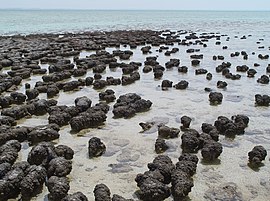Hamelin Pool, Western Australia
|
Hamelin Pool Marine Nature Reserve Western Australia |
|
|---|---|
|
IUCN category Ia (strict nature reserve)
|
|

|
|
| Nearest town or city | Denham |
| Coordinates | 26°26′28″S 114°20′58″E / 26.44111°S 114.34944°ECoordinates: 26°26′28″S 114°20′58″E / 26.44111°S 114.34944°E |
| Area | 1,270 km2 (490.3 sq mi) |
| Managing authorities | WA Department of Parks and Wildlife |
| Website | Hamelin Pool Marine Nature Reserve |
| See also | List of protected areas of Western Australia |
The Hamelin Pool Marine Nature Reserve is a protected marine nature reserve located in the UNESCO World Heritage–listed Shark Bay in the Gascoyne region of Western Australia. The 127,000-hectare (310,000-acre) nature reserve boasts the most diverse and abundant examples of living marine stromatolites in the world, monuments to life on Earth over 3,500 million years BP.
Hamelin Pool is the eastern major waters within Shark Bay, separated from the western area by the Peron Peninsula, with a smaller water body just adjacent to its northern border with Faure Island - L'Haridon Bight the juncture being defined by Petit Point. At the northern edge of the Hamelin Pool area is the Wooramel Seagrass Bank. The marine reserve is situated adjacent to the Hamelin Station reserve and the historic Hamelin Pool Telegraph Station about 30 kilometres (19 mi) west of the Overlander Roadhouse on the North West Coastal Highway. Access is via Hamelin Pool Road and then through the Hamelin Pool Telegraph Station grounds. Access is free.
The Marine Reserve covers 1,270 square kilometres (490 sq mi). It is one of only a few places in the world where living marine stromatolites can be found. Other locations for stromatolites include an underwater site (6 metres (20 ft)deep) in the Caribbean, Persian Gulf, and in the Great Salt Lake of Utah. Hamelin Pool contains the most diverse range of stromatolites in the world.
The stromatolites in Hamelin Pool were discovered by surveyors working for an oil exploration company in 1956 and were the first living examples of structures built by cyanobacteria. The cyanobacteria living in Hamelin Pool are direct descendants of the oldest form of photosynthetic life on earth. The stromatolites are similar to 3,500 million year old stromatolite fossils found in many places around the world. Stromatolites are an example of the earliest record of life on earth. They are found around the shores, mostly in the neighbourhood of 26°23′S 114°09′E / 26.383°S 114.150°E.
...
Wikipedia

